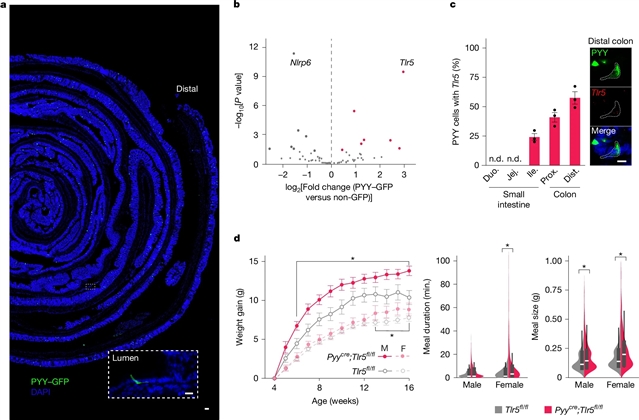
美国杜克大学Diego V. Bohórquez团队的最新研究提出了肠道对微生物模式的感知调节着摄食。这一研究成果发表在2025年7月23日出版的国际学术期刊《自然》上。
本研究表明,在单主题结肠中,无所不在的微生物模式鞭毛——跨门的统一特征——刺激肽YY (PYY)标记的结肠神经足细胞中的Toll样受体5 (TLR5)。这种刺激导致PYY释放到NPY2R迷走神经结节神经元以调节摄食。这些细胞中缺乏TLR5的小鼠比对照组吃得更多,体重增加更多。课题组发现鞭毛蛋白并不直接作用于神经。相反,鞭毛蛋白刺激来自结肠腔的神经足细胞,通过肠-脑感觉神经回路减少进食。
此外,鞭毛蛋白减少摄食独立于免疫反应,代谢变化或肠道菌群的存在。这种感觉使宿主能够根据其常驻微生物的分子模式调整其行为。该课题组把生物群和大脑交界处的这种感觉称为神经生物感觉。
据介绍,为了与居住的微生物共存,寄主必须有一种感觉来调整自己的行为以应对它们。在肠道中,对营养物质的感知通过神经上皮回路传导到大脑,引导食欲选择。然而,一种允许宿主实时响应来自常驻肠道微生物的刺激的感觉仍有待发现。
附:英文原文
Title: A gut sense for a microbial pattern regulates feeding
Author: Liu, Winston W., Reicher, Naama, Alway, Emily, Rupprecht, Laura E., Weng, Peter, Schaefgen, Chloe, Klein, Marguerita E., Villalobos, Jorge A., Puerto-Hernandez, Carlos, Kiesling Altn, Yolanda Graciela, Carbajal, Amanda, Aguayo-Guerrero, Jos Alfredo, Coss, Alam, Sahasrabudhe, Atharva, Anikeeva, Polina, de Araujo, Alan, Bali, Avnika, de Lartigue, Guillaume, Gil-Lievana, Elvi, Gutierrez, Ranier, Miao, Edward A., Rawls, John F., Kaelberer, M. Maya, Bohrquez, Diego V.
Issue&Volume: 2025-07-23
Abstract: To coexist with its resident microorganisms, the host must have a sense to adjust its behaviour in response to them. In the intestine, a sense for nutrients transduced to the brain through neuroepithelial circuits guides appetitive choices1,2,3,4,5. However, a sense that allows the host to respond in real time to stimuli arising from resident gut microorganisms remains to be uncovered. Here we show that in the mouse colon, the ubiquitous microbial pattern flagellin—a unifying feature across phyla6—stimulates Toll-like receptor 5 (TLR5) in peptide YY (PYY)-labelled colonic neuropod cells. This stimulation leads to PYY release onto NPY2R vagal nodose neurons to regulate feeding. Mice lacking TLR5 in these cells eat more and gain more weight than controls. We found that flagellin does not act on the nerve directly. Instead, flagellin stimulates neuropod cells from the colonic lumen to reduce feeding through a gut–brain sensory neural circuit. Moreover, flagellin reduces feeding independent of immune responses, metabolic changes or the presence of gut microbiota. This sense enables the host to adjust its behaviour in response to a molecular pattern from its resident microorganisms. We call this sense at the interface of the biota and the brain the neurobiotic sense7.
DOI: 10.1038/s41586-025-09301-7
Source: https://www.nature.com/articles/s41586-025-09301-7
Nature:《自然》,创刊于1869年。隶属于施普林格·自然出版集团,最新IF:69.504
官方网址:http://www.nature.com/
投稿链接:http://www.nature.com/authors/submit_manuscript.html
